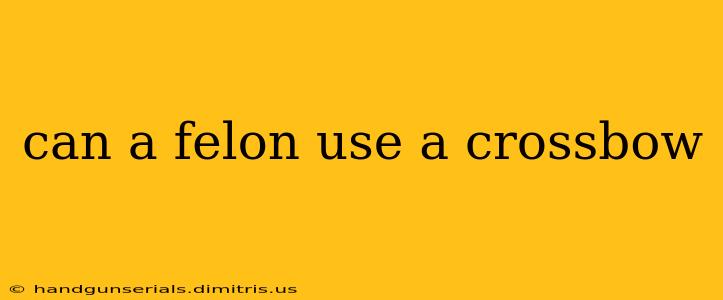The question of whether a felon can use a crossbow is complex and doesn't have a simple yes or no answer. While crossbows aren't always explicitly included in federal firearms restrictions, state laws vary significantly, and the specifics of a felon's past convictions play a crucial role. This article will delve into the legal nuances surrounding crossbow ownership and usage for felons.
Federal Gun Control Laws and Crossbows
Federal law, primarily the Gun Control Act of 1968, prohibits convicted felons from possessing firearms. The definition of "firearm" under federal law is key. Generally, it includes handguns and long guns (rifles and shotguns) but often omits crossbows. However, this doesn't mean blanket permission. The absence of explicit inclusion doesn't automatically grant felons the right to own or use crossbows.
State-Specific Laws: The Crucial Factor
The critical determinant is state law. Each state has its own laws regarding weapons possession, and these laws can differ substantially. Some states might explicitly include crossbows under their definition of prohibited weapons for felons, while others might not. Furthermore, the specifics of a felon's conviction can influence their eligibility. Some states might allow crossbow ownership if the conviction isn't for a violent felony.
Key Considerations in State Laws:
- Definition of "Firearm": Does the state's definition of "firearm" encompass crossbows? This is the primary point of legal contention.
- Type of Felony: The severity and nature of the felony conviction often matter. Violent felonies typically result in stricter restrictions than non-violent ones.
- Restoration of Rights: Some states allow for the restoration of firearm rights (potentially including crossbows) after a certain period or upon successful completion of parole or probation.
Finding Your State's Specific Laws
To determine whether a felon can legally use a crossbow in their specific state, it's absolutely essential to consult the state's statutes directly. This can usually be done through the state legislature's website or by contacting a legal professional specializing in firearms law.
Disclaimer: The information provided in this article is for educational purposes only and does not constitute legal advice. Always seek the advice of a qualified legal professional for any questions regarding your specific circumstances and legal rights.
Understanding the Potential Risks
Even if a state's laws don't explicitly prohibit crossbow ownership for felons, possessing a crossbow could still have legal ramifications. For example:
- Misinterpretation of Laws: Law enforcement officers might misinterpret the law and arrest a felon for possessing a crossbow, even if technically legal.
- Violation of Parole/Probation: Even if legal in the state, possessing a crossbow could be a violation of parole or probation conditions.
Conclusion: Proceed with Caution
The legal landscape surrounding crossbow ownership for felons is intricate and depends heavily on individual state laws and the specifics of a person's criminal record. It is crucial to exercise extreme caution and consult legal counsel before possessing or using a crossbow if you have a felony conviction. Ignorance of the law is not a defense, and potentially serious consequences can arise from misunderstanding these complex regulations. Always prioritize legal compliance and safety.

